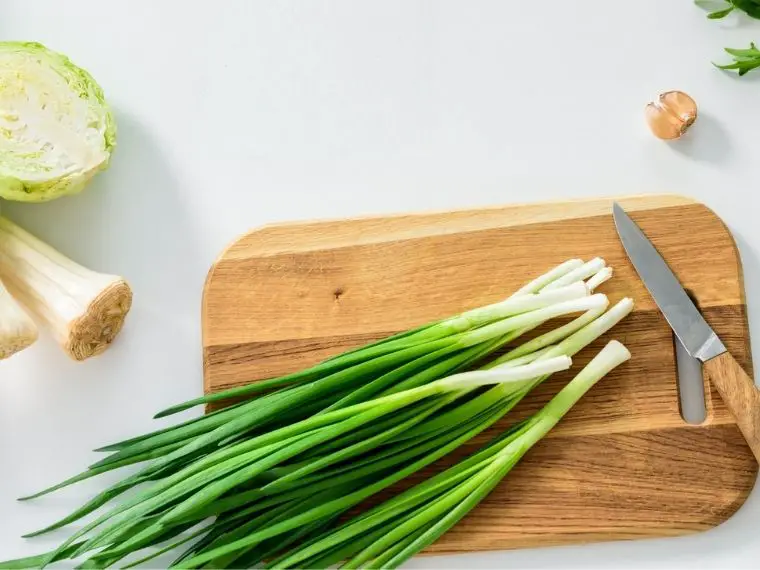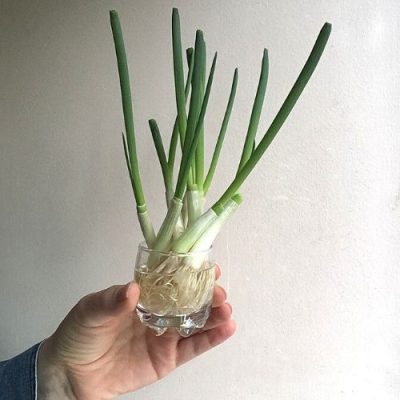You’re wondering how to store green onions or scallions so that they stay good for longer. The good news is that there are a variety of ways to store green onions to keep them fresh!
You can store them in a jar of water in the windowsill, in a jar of water in the refrigerator, in a plastic bag in the refrigerator, loose in the refrigerator, or even on the counter.
Each method of storing green onions has it’s pros and cons so keep reading to learn the tips, tricks, and troubleshooting, plus find out which method is the best!
Please note that scallions and green onions are the same thing, so I will be referring to both in this article.

How to store green onions/scallions
1. In a jar of water in the windowsill
Storing scallions/green onions in a jar of water in the windowsill is the best way to store them, hands down.
This is because they will not only last for months, they will continue to regrow so your initial purchase will easily be doubled or tripled!
By doing this you’re essentially keeping them alive and allowing them to keep growing. They will take up water from the jar and use the sunlight to continue growing free food for months!
How long do green onions last stored in water on the windowsill?
You can expect them to last months using this method. Not only do they store for a long time, they are actually continuing to grow so you will actually get more green onions than you started with!
Note: this method only works when scallions/green onions still have the root ends attached. If they’re already cut off, try putting them in a plastic bag in the fridge as described later in this article.
For the full instructions on how to keep regrowing green onions (and other veggies) like this, get the Regrowing Veggies From Scraps ebook!
The ebook, Regrowing Veggies from Scraps, gives step-by-step instructions on how to regrow green onions, celery, romaine lettuce, iceberg lettuce, and butter lettuce from just the scraps you’d normally toss! Plus it also includes how to grow microgreens!
Get the Regrowing Veggies From Scraps ebook for only $6 with coupon code READER
2. In a jar of water in the refrigerator
The next best way to store green onions is in a jar of water in the refrigerator. This will keep them fresh for up to two weeks before they start wilting, so it’s not bad at all!
This is a great option to store scallions for quite a long time if you don’t want to put them in the windowsill. Simply place the roots in a jar with an inch or two of water and loosely cover the tops with a plastic bag.
How long do green onions last stored in water in the fridge?
They will last 1-2 weeks like this.
It’s worth mentioning that you’ll need to change their water once or twice per week and they may rot if the water gets stagnant, or dry out if there isn’t enough water. Make sure to check the water and change it few days so it stays fresh.
Note: this method only works when the green onions still have the root ends attached. If they’re already cut off, the next method will be your best option.

3. In a plastic bag in the refrigerator
Storing scallions/green onions in a plastic bag in the fridge is a good way to pre wash and prep them in advance.
This is the best method to use if your green onions already have the root end cut off at the store, which would make the two methods above not possible.
Make sure to cut off the root ends, then cut the green from the white parts. Bundle the white and green parts separately, then loosely wrap in paper towel and place in a plastic bag. Once you cut them, store them immediately to prevent wilting and browning.
Make sure to label the bag with the contents so you don’t forget what’s in there! Make sure the bag of green onions doesn’t get squished or else they will go bad very quickly!
How long do green onions last stored in a bag in the fridge?
They should last 2-3 weeks like this. The plastic bag keeps the humidity in so they don’t dry out, while the paper towel absorbs excess moisture so they don’t get slimy.
Now you know you can extend the life of your green onions by storing them in a plastic bag. Although this method doesn’t store green onions as long as the previously described methods, it can be more convenient because the prep work is already done and it will take up less space in your fridge.
How long does green onion last loose in the fridge or on the counter?
Green onions don’t last more than a few days without a source of hydration/humidity so the next two options should only be used if you plan on using the whole bunch within a day or two.
4. Loose in the refrigerator
Storing green onions loose in the refrigerator, as in, just putting them on a shelf or in a drawer is not an optimal way to store them, but it’s totally fine to do if you know you’ll be using the whole bunch within a few days.
That’s because green onions are pretty susceptible to dehydration so it won’t be long until you notice them starting to wilt and shrivel up. The cool air of the refrigerator will help keep them fresh for a few days at least.
5. On the counter
Storing green onions loose on the counter is the least optimal way to store them. They are likely to wilt and shrivel within a day or two if you just leave them on the counter. It’s much better to put them in a glass of water in the windowsill or in the fridge in order to store them longer.
Other tips for how to store scallions/green onions
- No matter which way you choose to store your scallions/green onions, make sure to check them every few days.
- If there are any dried, shrivelled or slimy parts, remove them and make sure to use up the rest of the bunch soon.
- Cut off the root end of the onion before storing it in a plastic bag so that it won’t rot
- Place green onions at the back of your refrigerator where they are coldest, but not frozen
- If your scallions become limp but not slimy, they’re still good to eat! (They’re just dehydrated!). Chop them and add them to a cooked meal where they will get soft anyway. You could also add the whole scallion into a bowl of ice water to rehydrate them.Place in a bowl of cold water with ice cubes to keep it fresh
- If you’re storing them in water, change out the water every couple of days to prevent spoilage from occurring quickly
FAQ About Storing Green Onions/Scallions:
Green onions/scallions that are properly stored in the fridge will last up to 1-2 weeks. Storing them upright in a glass of water and loosely covered by a plastic bag will help it last the longest. Cutting them, wrapping in paper towel, then storing them in a plastic bag is the next best option. Storing green onions loosely in the fridge will cause them to wilt within a day or two so is not the best option.
Green onions and scallions are basically the same and can be used completely interchangeably in recipes. Depending on where you’re from, you might notice that one or the other might be more commonly used, but again, green onions and scallions are just two different names for the same thing.
The best substitute for green onion are scallions, which are actually the same thing! So if your recipe calls for green onions and you only see scallions at the store, get them!
Other good substitutes for green onions are chives, spring onions, or leeks. They all have similar mild flavor and you can eat the green and white parts of each (although I would recommend cooking the green part of leeks as they’re not as tender as the others which can be eaten raw).
Green onions don’t need to be refrigerated, but you can refrigerate them if you wish. If you don’t refrigerate green onions, place them in a glass of water in the windowsill to have them last longer.
Storing green onions in water is an easy way to extend their shelf life, but it’s not necessary. You can also store green onions wrapped in paper towel in a plastic bag in the fridge.
You should wash your green onions before storing them so they’re ready to use when you’re cooking. To keep them fresh, make sure they are dry before storing them.
Green onions and scallions can be tricky to store. They’ll go bad before you have a chance to use them if they’re not stored properly, but now you know there are a variety of ways to store green onions to keep them fresh for longer.
You can store them In a jar of water in the windowsill, in a jar of water in the refrigerator, in a plastic bag in the refrigerator, loose in the refrigerator, or even on the counter.
Now that you know how to store green onions/scallions, you’re sure to reduce food waste and help you spend less on groceries too! Check out the article how to regrow green onions indoors and don’t forget to get the regrowing veggies ebook so you have easy reference to how to keep green onions alive for months!
The ebook, Regrowing Veggies from Scraps, gives step-by-step instructions on how to regrow green onions, celery, romaine lettuce, iceberg lettuce, and butter lettuce from just the scraps you’d normally toss! Plus it also includes how to grow microgreens!
Get the Regrowing Veggies From Scraps ebook for only $6 with coupon code READER



Thank you…I just purchased my green onions and will definitely put them on the window sill
Thanks for sharing such a valuable piece of content.!
Hello,
I am wondering if the green onions can be stored in a mason jar in the refrigerator with an inch or two of water. The refrigerator method provided above says loosely covered, so I am wondering if they will go bad faster if I were to try with a mason jar. It would be convenient because that is how I have recently started storing my fruit. Thank you!
I think that would work as long as the mason jar was loosely covered with a plastic bag or something. If the mason jar lid was sealed I don’t know if that would make them go bad faster or not. If they weren’t cut I imagine they would last pretty long like that 🙂
‘type’ of light thank you
Stored in water on windowsill, in what time of light?
you’ll need at least a couple hours of indirect sunlight per day. The more sun, the faster the green onions will regrow! Check out this article for more info https://frugalminimalistkitchen.com/regrow-green-onions-indoors/